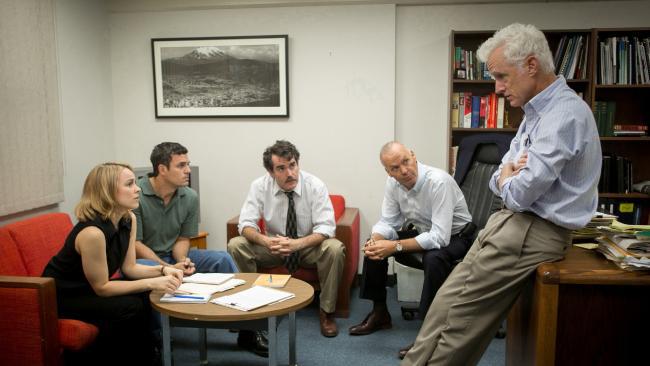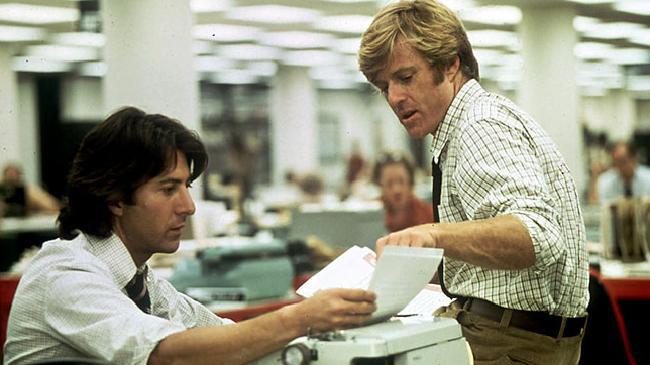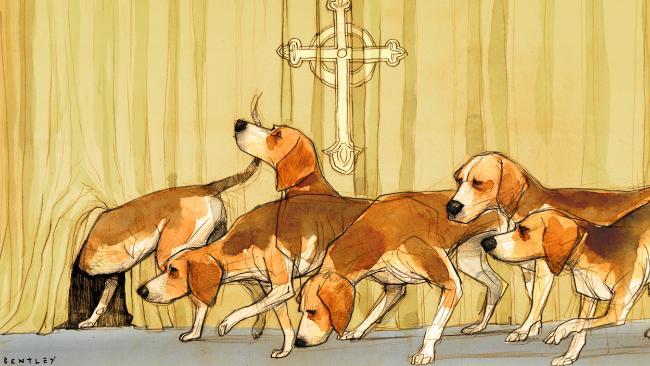|
Journalism finally gets some good press
By Angela Mollard
There’s a scene in the Oscar-winning movie Spotlight where all the pieces of the puzzle come together. For months the reporters on the Boston Globe have been investigating sexual abuse by priests but the “light bulb” moment occurs when they realise that offending priests are listed in the diocese’s annual directory as “unassigned” or “on leave”. And so, using rulers and pens, the team goes painstakingly through years of directories, underlining the names of priests who have taken leave of their parishes. They enter the information on a spreadsheet and what was originally believed to be six priests suddenly appears to be 87. If you’re a journalist watching that moment there’s both recognition and regret: recognition of the meticulous, mind-numbing work but, more potently, regret that investigative journalism is now as endangered as the many institutions it has exposed. Journalists loathe writing about journalism. We focus on what we produce, not how we produce it. We’re notoriously secret squirrels scrabbling around scrutinising and elucidating on every industry but our own. Even our awards nights are an uncomfortable showcase of bad dressing and neuroticism. But sometimes we need to turn the pen on ourselves, to advocate, campaign or simply be a journal of record for what’s happening in our world. Sometimes there needs to be a story about the storytellers. So here’s the gist. Bored with Jennifer Aniston and terrorism blockbusters and multiple franchises of The Hangover, Hollywood is suddenly fascinated with investigative journalism. Spotlight is best in class, not just because it documents the cover-up of sexual abuse, but because it shows the curiosity, tenacity, and fortitude required by journalists to bring such a story to light. Philomena, starring Judi Dench and Steve Coogan did likewise, exposing the forcible adoptions that occurred in Ireland during the 1950s. The Program is another, a film not just about the downfall of Lance Armstrong but The Sunday Times journalist David Walsh who worked tirelessly to prove his hunch that the cyclist was a liar and a cheat. And hopefully soon Attacking the Devil will make its way to our shores, a documentary film recounting the long journalistic battle to win compensation for thalidomide victims. Not since All The President’s Men has our ilk garnered so much respect. It’d be lovely to bathe in the glory and worthiness of our trade; to reminisce about why we chose these careers in the first place; to breathe a sigh of relief that we’re not being portrayed as buffoons or dysfunctional workaholics as per Anchorman or The Newsroom. But the truth is investigative journalism is no longer a beast with bared teeth but a beleaguered mongrel limping along on an amputated leg. Digital disruption, the rise of “churnalism”, reduced advertising revenue and news lists formulated for clicks not credibility, have decimated newsrooms and the resources once devoted to probing and researching, even if there was no guarantee of an outcome. Of course online is, and should be, our future. Immediacy is as important as any nostalgia for ink. But if modern media is to be more than a shop window for the Kardashians then both its proprietors and its audience needs to believe in and fund what it does best. Sometimes a journalist is the last port of call for those who are being ignored or stymied. Would CommInsure’s appalling treatment of customers have come to light this week were it not for Four Corners? Would the Australian Wheat Board scandal have been rumbled had there not been forensic research by reporters? When the Turks are protesting for freedom of speech following the state takeover of the nation’s largest newspaper, it’s incumbent on all of us to uphold what we have: an independent, robust and probing media that serves not just as an informer and entertainer but as a watchdog. I started my career as a foot soldier for one of the UK’s best investigative reporters. He got the glory; I did the legwork. I’d knock on doors, pore over cuttings, phone every number on a list of 100. When I graduated to investigating my own subjects, it was thrilling to have not just an editor but a readership championing my efforts. Once it took me two months to secure a job in a chicken factory so I could go undercover to expose the dodgy practices. The public was appalled. The manufacturers were forced to raise their game. Chicken, churches — all elements of society should be up for scrutiny by the Fourth Estate not because of the Pulitzers on offer but because it provides a vital public service. Marty Baron, the editor of the Boston Globe who now helms the Washington Post, has seen Spotlight three times and each time has teared up at the same place: the scene in which an elderly reader is digesting the paper’s expose and must confront the truth about her church. Baron says Spotlight is a “love letter to investigative journalism”. It is, but as well as being a sentimental ode to the practice it must also be a galvanising reminder of why we need it.
|
.
Any original material on these pages is copyright © BishopAccountability.org 2004. Reproduce freely with attribution.


